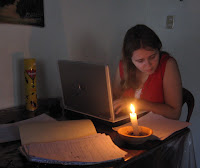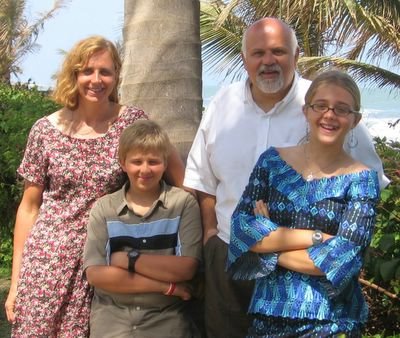Weather: August 8 was our area’s last day with any notable sun. Since then it has been cloudy with most days seeing a low, heavy overcast. In the 19 days since August 8, there have been 228 hours of daylight. Of these, there has been an aggregate of less than 6 hours of sun. The rest of the time-- overcast. Some rain every day, with average per day totals about a half inch. Westerly to southwesterly wind every day.
Weather Update, September 1: August 28 ushered in four days of partly sunny skies and little day rain, although we had about a half inch every night, and Thursday night gave us the loudest thunder we have ever heard here, and two inches of rain. But the sunshine was heavenly. Today brings overcast and light rain. Winds SSW.
Around the Reed home, the loss of our friend Norm Katerberg along with constant overcast tests our ability to see the proverbial glass as half-full. But loss and dark skies are the everyday story of our Liberian neighbors, so, like they do, we simply continue on with the next thing. Eventually the skies will brighten and the sharp sting of loss will fade. And there are breaks in the clouds even now.
Item- Niki, the oldest dog in the neighborhood—she’s two—is pregnant! That’s right, our licking-coward-turned-faithful-barker discovered that seven month old Max has what it takes for fatherhood. This is good news for us and even our neighbors. Because the country lost so many of its dogs in the war, and rogues continue roam the country side, good dogs are in demand. We will raise them for a few months, keep the female of our choice, and find good homes for the rest.
Item- Summer is the time Renita ramps up her out-of-home activity. She continues her dual LEAD responsibilities with the regular program and the WFP training for women who are also HIV positive. The other day, she left for Buchanan at 7:00am and did not arrive back until 10:00pm. Bad roads, long interviews with LEAD loan applicants and a flat tire conspired. She finally made it back after giving out 17 loans, and promptly crashed.
Item- I’m still in a slower summer mode, composing emails to be sent, watching the kids while Renita ventures, puttering around the generator/solar scheme, trimming coconut trees with the boys, and occasionally going in to Monrovia to meet with MPCHS staff—including a new PhD in psychology sent by a German INGO to work with us for a couple years. We continue to refine the upcoming BSW program and will be interviewing our last batch of candidates next week. Correspondence and planning with Kuyper and Calvin Colleges continues.
Item- Noah is feeling sick and has been for about ten days. His only complaint is nausea so we think it’s a result of his anti-malaria medicine, so we’ll switch it tomorrow to see if it works.
Around the Reed home, the loss of our friend Norm Katerberg along with constant overcast tests our ability to see the proverbial glass as half-full. But loss and dark skies are the everyday story of our Liberian neighbors, so, like they do, we simply continue on with the next thing. Eventually the skies will brighten and the sharp sting of loss will fade. And there are breaks in the clouds even now.
Item- Niki, the oldest dog in the neighborhood—she’s two—is pregnant! That’s right, our licking-coward-turned-faithful-barker discovered that seven month old Max has what it takes for fatherhood. This is good news for us and even our neighbors. Because the country lost so many of its dogs in the war, and rogues continue roam the country side, good dogs are in demand. We will raise them for a few months, keep the female of our choice, and find good homes for the rest.
Item- Summer is the time Renita ramps up her out-of-home activity. She continues her dual LEAD responsibilities with the regular program and the WFP training for women who are also HIV positive. The other day, she left for Buchanan at 7:00am and did not arrive back until 10:00pm. Bad roads, long interviews with LEAD loan applicants and a flat tire conspired. She finally made it back after giving out 17 loans, and promptly crashed.
Item- I’m still in a slower summer mode, composing emails to be sent, watching the kids while Renita ventures, puttering around the generator/solar scheme, trimming coconut trees with the boys, and occasionally going in to Monrovia to meet with MPCHS staff—including a new PhD in psychology sent by a German INGO to work with us for a couple years. We continue to refine the upcoming BSW program and will be interviewing our last batch of candidates next week. Correspondence and planning with Kuyper and Calvin Colleges continues.
Item- Noah is feeling sick and has been for about ten days. His only complaint is nausea so we think it’s a result of his anti-malaria medicine, so we’ll switch it tomorrow to see if it works.
.
Item Update 9/1-- The Corrosion Beast has struck again! On Tuesday, I could not get into my computer, but the evidence pointed to a failure in the operating system. With help, I would be able to retrieve my data, files, and folders, and get back to work after reinstalling Windows. No such luck. On Wednesday, Mr. Tanu, the MPCHS computer guy brought his data retrieval gismo and we learned together the gut punching truth: the hard drive was shot.
.
Item Update-- The Fallout. There was good news and bad news out of this blow ragarding my computer. Renita and I had backed up almost all our data elsewhere. The very bad news was, even though both of us could swear we had seen it backed up, all of my most important files-- the courses and workshops I'd developed, my MPCHS work, my Mental Health Task Force work-- in short all of my work over the past two years-- was not backed up. Plus our email address book was gone. The data exists now only on my broken hard drive.
.
Item Update-- The Plan. We need to get that data off the hard drive. We have heard of people here who can do it, but if need be, we will DHL or FedEx it back to the States to get it back.

Sometimes it comes straight, sometimes at an angle, but every day it comes.

Renita and the women in the WFP HIV-AIDS program.

On top, a trim, vigorous Niki "before." Below, heavy with pup. "Wha' is happening to me"?

...and as Noah and Trkon fade into the East headin' toward their fishin' hole, we wish you a fond farewell.






